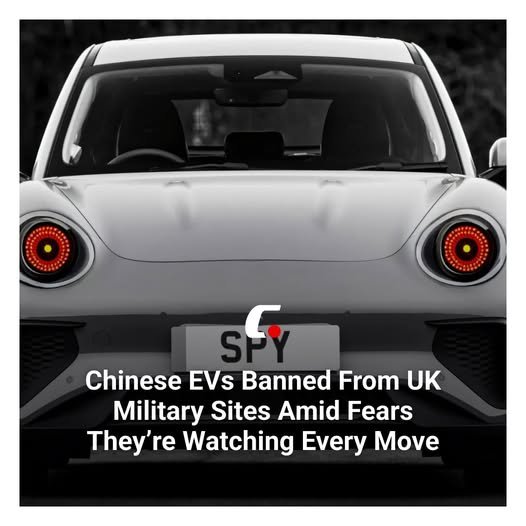In light of espionage fears, the UK is restricting Chinese EVs and vehicles with Chinese components near sensitive sites
- UK military staff are being advised not to park EVs with Chinese parts near sensitive sites.
- Fears stem from Chinese laws granting government access to data collected by EV sensors.
- The Defense Ministry wants “to mitigate any potential threats to national security from vehicles”.
Electric vehicles are becoming more advanced by the year, but their growing arsenal of sensors comes with growing concerns. Modern EVs are loaded with cameras, radar, and other tech that could, in theory, be used to collect sensitive data. With that in mind, UK military personnel have been quietly instructed not to park EVs containing Chinese parts near military facilities.
Officials have also been advised to avoid having sensitive conversations inside vehicles manufactured in China, citing fears of potential surveillance.
More: US President Says Chinese Cars Could Spy On Americans
According to UK legislation, the Chinese government has legal access to data collected by the cameras, sensors, and radar in locally built EVs. That access has raised concerns among UK officials about how this data might be used. These restrictions aren’t limited to brands based out of China, such as BYD, Great Wall Motors, MG, and Omoda. They also apply to any electric vehicle that incorporates Chinese-made components or technology.
Base Restrictions Reach the Ground
Citing insider sources, UK outlet The iPaper reports that personnel at RAF Wyton in Cambridgeshire have been told to park EVs with Chinese parts at least two miles away from key buildings. Similar restrictions are rumored to be in place at the Salisbury Plain military training area.
While these measures haven’t been officially announced, they’ve been hinted at in parliamentary discussions. According to the Daily Mail, Lord Coaker, Minister of State at the Ministry of Defense, said that the government is working with other departments to “understand and mitigate any potential threats to national security from vehicles.”
Coaker was careful not to single out any one country, stating: “Our policies and procedures take account of the potential threats from all types of vehicle, not just those manufactured in China, and we have issued appropriate internal direction to all drivers and passengers. There are no centrally mandated policy restrictions on the movement of Chinese manufactured vehicles.”
A Push for Stricter Rules
He also acknowledged that some defense organizations may enforce stricter rules of their own, depending on the location, but added: “We do not provide specific details for security reasons.”
More: Massive VW Data Leak Exposed 800,000 EV Owners’ Movements, From Homes To Brothels
The Ministry of Defense did not confirm or deny the restrictions, offering a general statement: “Protecting national security is the foundation of everything we do. We have strict security procedures in place to ensure all sensitive information is protected.”
Conservative Shadow Security Minister Alicia Kearns criticized what she sees as a lack of decisive action. “The military and government know the risks of Chinese espionage, but we cannot maintain our security with half-hearted measures,” she said. Kearns has called for a complete shift away from Chinese-made EVs in both government and military fleets.
These kinds of bans aren’t new. Over the past few years, China has implemented a similar restriction on Tesla vehicles, expanding it from military staff to government contractors, local authorities, highway operators, exhibition halls, and cultural centers. In that case, the concern was that the U.S. government could potentially access geographic and environmental data collected by Tesla.



